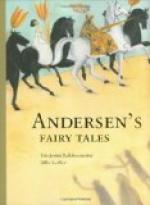The next morning she was asked how she had slept. “Oh, very badly indeed!” she replied. “I have scarcely closed my eyes the whole night through. I do not know what was in my bed, but I had something hard under me, and am all over black and blue. It has hurt me so much!”
Now it was plain that the lady must be a real Princess, since she had been able to feel the three little peas through the twenty mattresses and twenty feather beds. None but a real Princess could have had such a delicate sense of feeling.
The Prince accordingly made her his wife; being now convinced that he had found a real Princess. The three peas were however put into the cabinet of curiosities, where they are still to be seen, provided they are not lost.
Wasn’t this a lady of real delicacy?
THE SHOES OF FORTUNE
I. A Beginning
Every author has some peculiarity in his descriptions or in his style of writing. Those who do not like him, magnify it, shrug up their shoulders, and exclaim—there he is again! I, for my part, know very well how I can bring about this movement and this exclamation. It would happen immediately if I were to begin here, as I intended to do, with: “Rome has its Corso, Naples its Toledo”—“Ah! that Andersen; there he is again!” they would cry; yet I must, to please my fancy, continue quite quietly, and add: “But Copenhagen has its East Street.”
Here, then, we will stay for the present. In one of the houses not far from the new market a party was invited—a very large party, in order, as is often the case, to get a return invitation from the others. One half of the company was already seated at the card-table, the other half awaited the result of the stereotype preliminary observation of the lady of the house:
“Now let us see what we can do to amuse ourselves.”
They had got just so far, and the conversation began to crystallise, as it could but do with the scanty stream which the commonplace world supplied. Amongst other things they spoke of the middle ages: some praised that period as far more interesting, far more poetical than our own too sober present; indeed Councillor Knap defended this opinion so warmly, that the hostess declared immediately on his side, and both exerted themselves with unwearied eloquence. The Councillor boldly declared the time of King Hans to be the noblest and the most happy period.*
* A.D. 1482-1513
While the conversation turned on this subject, and was only for a moment interrupted by the arrival of a journal that contained nothing worth reading, we will just step out into the antechamber, where cloaks, mackintoshes, sticks, umbrellas, and shoes, were deposited. Here sat two female figures, a young and an old one. One might have thought at first they were servants come to accompany their mistresses home; but on looking nearer, one soon saw they could scarcely be mere servants;




